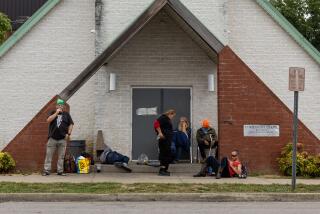Michigan’s Welfare Cut ‘Took All the Dreams Away,’ Ex-Recipient Says : City poverty: Loss of benefits forced Patricia Wilson, a recovering cocaine addict, out of her home and into a shelter for the homeless.
- Share via
DETROIT — A drug addiction, a stint as a prostitute and four children out of wedlock didn’t strip Patricia Wilson of hope.
Gov. John Engler did that, she says, when he cut General Assistance welfare benefits for her and 82,613 other Michigan residents last month.
Evicted from her rented home, she has sought refuge in a shelter on Detroit’s seedy Cass Corridor.
“It’s a living nightmare,” said Wilson, 31, whose new home is in a neighborhood infested with prostitutes and crack dealers.
“This is America, land of money and opportunity. This is Detroit, the Motor City. Engler took all the dreams away.”
Homeless people have long endured the streets of the nation’s seventh-largest city, where the winters can be as bitter as the crime. But despair is more evident lately at Wilson’s temporary home, the Detroit-Wayne County Homeless Union shelter.
Filthy strips of flypaper twirl slowly in cigarette smoke wafting through a large room crammed with 100 cots, most occupied by young men.
Strangers bound by poverty exchange high-five hand slaps, but few smile. Many watch television; others doze or lose themselves in music from stereo headsets.
“Please, No Knives, Guns or Paraphernalia in the Drop-In Center,” one flier admonishes. Another explains “Why Engler Must Go.”
The Republican governor’s populist pledge to reduce state spending--resulting in cuts to welfare, among other programs--has caused a curious role reversal in metropolitan Detroit.
Residents of the usually detached suburbs have responded with food and clothing donations. But Detroit landlords have evicted dozens of former General Assistance recipients and threaten to oust thousands more in coming weeks.
“They didn’t waste time,” said Wilson, who was evicted within seven days of Engler’s Oct. 1 cancellation of payments to able-bodied, childless adults.
Wilson said she had qualified for benefits when her mother assumed legal guardianship of her daughter, Katie, 15, and sons Mardell, 12, Laydell, 4, and Nidell, 8 months. The family agreed to the arrangement until Wilson could recover financially and overcome a drug addiction.
“All the landlords heard on television was that these cuts were coming, and they were prepared,” said Wilson, a former barmaid and clerk-typist who hasn’t worked in three years. “I left one day for a few hours. When I came back, there were new locks.”
Life even with the monthly $200 General Assistance checks was a struggle for Wilson, who said she often didn’t receive payments because state computers frequently malfunctioned. She turned briefly to prostitution to survive.
Monthly rent on her former home, a three-bedroom brick bungalow, cost $200, forcing her to make ends meet with $183 in monthly food stamps and a personal-needs allowance.
“You eat a lot of chicken,” she said. “You can bake it, fry it, stew it, boil it. You eat a lot of rice and potatoes. Then there’s the almighty beans: lima beans, pinto beans.”
Though she’s trying to conquer a cocaine addiction, Wilson scoffs at the suggestion that some homeless people may have used General Assistance to finance drug and alcohol habits.
“You can’t even afford to buy a bottle of wine,” she said. “It wasn’t enough, but I made ends meet with it. It covered the bills in the summer. In the winter, you’re always in debt because you have to pay for heat.”
Wilson’s five-week stay at the Cass Corridor shelter has exceeded its two-week limit. But shelter spokesman and counselor Richard Williams said he can’t bring himself to tell her to leave.
“With all these cuts, we’re trying to be lenient with the rules,” he said. “How can we tell her it’s time to go when she doesn’t have any place to go?”
More to Read
Sign up for Essential California
The most important California stories and recommendations in your inbox every morning.
You may occasionally receive promotional content from the Los Angeles Times.













